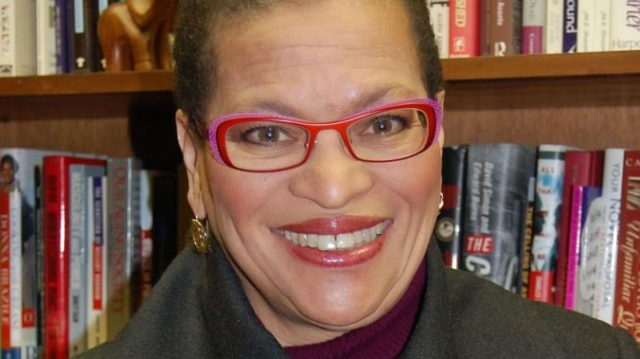By Julianne Malveaux
What would you do if somebody walked by your house and promised to rob it the next day? Most of us would take every precaution, checking the locks, the door, and the windows. Some of us might weapon up, making sure we could defend our homestead. Some might also reach out to law enforcement, sharing the threat with them. Almost all of us would take the threat seriously and make the appropriate precautions to prevent our violation.
The 45th President of the United States has warned us that he plans to rob us. First, he placed one of his crooked cronies in charge of the postal service. Then he said that he would not fund the postal service to facilitate the timely processing of mail ballots. He has continuously associated mail voting with fraud, although nine states have had universal mail voting for years. And finally, he just put it out there, plain and simple. He thinks mail voting favors Democrats, and he doesn’t want to do Democrats any favors. So instead, his postal chief is removing mailboxes and shutting down sorting machines. And now the USPS has warned election officials in most states that ballots mailed before election might not arrive in time to be counted.
The 45th President is setting up a situation where the November election can be contested. He’s doing it because he has already stacked the Supreme Court in his favor. He has no interest in maximizing the number of people voting but minimizing that number. He’s not interested in democracy, but in dictatorship.
If someone told you they were planning to rob you, you’d take precautions. Trump has declared that he intends to steal this election. We can’t let him do it. Not only must the Biden-Harris ticket beat him, but they must beat him like a drum, so decisively that there is no doubt that he has got to go.
Here’s what you must do.
- Voting procedures vary by city and state. Make sure you know the rules. Some places send all registered voters mail-in ballots, while others require you to request an absentee ballot. Find your local Bureau online, or call your favorite local elected to get the information.
- Return your ballot in the shortly after you get it. If you put your ballot in the mail on election day November 3, it may not be counted. Some places will have drop boxes for ballots, and others will allow you to drop off your ballot. Just get your ballot back by whatever means necessary.
- If you prefer to vote in person, or if you’ve neglected to mail your absentee ballot, make sure you know where your polling place is. Because of the coronavirus, some cities are reducing the number of available polling places, and the site where you usually vote may be closed.
- It is also possible to vote early in person. Check with your Board of Elections about when and where you might vote early.
- Be patient. Conducting an election amidst a pandemic is new for us, and some election procedures have been unnecessarily politicized. You may encounter obstacles if you choose to vote in person. Document any hurdles you have to clear, get names of anyone who denied you the right to vote, and complain if the matter is not resolved. The Lawyer’s Committee for Civil Rights Under Law runs a hotline on election day. Their number is 866-OURVOTE, or 866-6878683.
- Spread the word. Reach out to your circle to share information about voting and encourage your friends and colleagues to vote.
- Because of the coronavirus, which is not likely to be gone by November, there will be fewer gatherings to discuss the vote. Be on the lookout for zoom town halls and other meetings that civic organizations are holding. Encourage your church, your sorority, or your local NCNW section to consider virtual town halls.
It is in some people’s interest to suppress the vote, and we’ve seen enough of it these past few years. It is your absolute right to exercise the right to vote, even if some make it difficult. We don’t have to guess the number of jelly beans in a jar or translate a passage of the Constitution into Latin, as our foremothers did. It is in their honor and the memory of Congressman John Lewis that we vote.
Julianne Malveaux, PhD is an economist and author and President, Economic Education. For more information please visit www.juliannemalveaux.com or email booking@juliannemalveaux.com.




